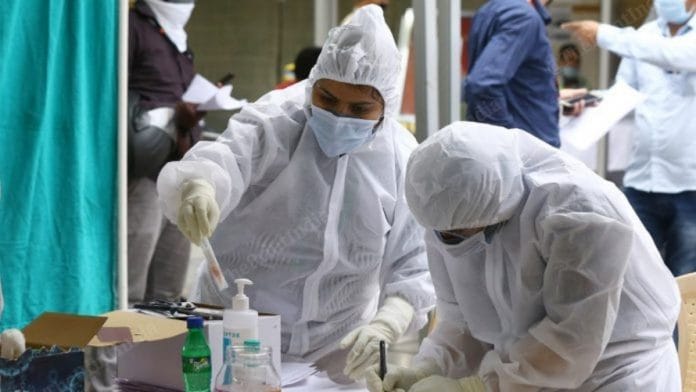New Delhi: A recent study has found that at least 10 per cent of the patients who experienced an extreme case of Covid-19 pneumonia carry ‘autoantibodies‘ that attack their own interferons.
Interferons (IFNs) are proteins, which are released from human cells while responding to a virus infection.
Autoantibodies or auto-abs are kinds of antibodies that “react with self-antigens”. These antibodies are developed when the immune system can’t differentiate between self and other antigens.
Published in Science journal on 23 October, the study was conducted by researchers from the US, Canada, Paris and Italy, among other countries.
The researchers studied 987 patients with “life-threatening” Covid-19 pneumonia, and of them, 101 patients had immunoglobulin G (IgG) antibodies, which “neutralise” the ability of type 1 interferons to block the infection.
A type 1 interferon is responsible for combating a viral infection and driving an immune response. The absence of type 1 interferon could lead to greater susceptibility to infection.
IgG is one of the several types of autoantibodies.
“These auto-abs neutralise high concentrations of the corresponding type 1 IFNs, including their ability to block SARS-CoV-2 infection in vitro,” the study said.
Of the 987 patients, who had a critical case of Covid, 663 were asymptomatic, while the rest were symptomatic.
Autoantibodies were found in none of the patients, who had mild symptoms of Covid or were asymptomatic.
The researchers also studied 1,227 healthy people, of which only four were found to have autoantibodies, the study stated.
Researchers also found that age had a role to play.
“The patients with auto-abs were 25 to 87 years old (half of them aged over 65 years) and of various ancestries,” they said.
Also read: If we want to beat Covid, we have to think like virologists
‘Major sex bias’
The study also explored why men may have been affected by Covid more in comparison to women.
The study pointed at a “major sex bias” witnessed in patients experiencing life-threatening infection. Out of the 101 patients, who were found to have autoantibodies, 95 were men.
“There is a marked bias in favour of men, which suggests that the production of auto-abs against type 1 IFNs — whether driven by germline or somatic genome — may be X chromosome-linked and therefore preexisting to infection,” it said.
The findings also suggested that autoantibodies being generated against interferons were a “cause” and not a “consequence” of the Covid-19 infection.
However, their titers (a measure of the amount of antibodies in blood) could be “enhanced” by Covid-driven induction of interferons, the study said.
Patients must be excluded from donating plasma
Researchers concluded that these findings could be used to screen Covid patients in order to identify those with autoantibodies who run the risk of developing life-threatening Covid.
“Such patients recovering from life-threatening Covid-19 should also be excluded from donating convalescent plasma for ongoing clinical trials, or at least they should be tested before their plasma donations are accepted,” it said.
Also read: What are Covid mutations in India? Are they more infectious? Gene sequencing has the answers






